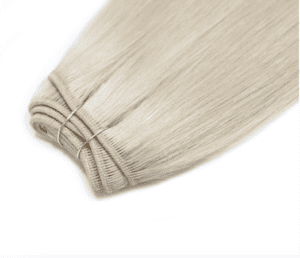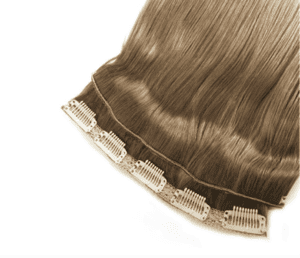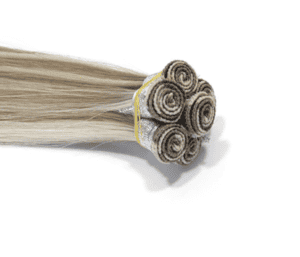As a salon owner or hairstylist, understanding the factors that affect the cost and value of hair extensions is crucial to not only enhance your client's experience but also to optimize your salon's profitability.
Hair extensions have become increasingly popular as they offer an instant transformation, adding length, volume, and even color to one's natural hair.
With myriad types of hair extension options available, from clip-ins and tape-ins to micro-links and keratin bonds, it's essential to be well-versed in the various hair extension types, their quality, and their application methods.
In this blog post, we'll delve into the world of hair extension pricing, exploring the key factors that influence cost and value, empowering you to make informed decisions for your salon and clientele. So let's get started on our journey toward hair extension mastery!
Factors that Affect the Hair Extensions Cost

Hair Extension Types and Materials
Human hair extensions are made from actual human hair, which can be sourced from a variety of places, including India, Europe, and the United States.
The quality of human hair extensions varies widely depending on the origin of fine hair of the donor and how it has been handled. Human hair is available in a variety of textures, such as straight, wavy, and curly.
Synthetic hair extensions are made from non-human fibers, such as Kanekalon, which is a type of polyester fiber.
Synthetic hair has a much shorter lifespan than human or natural hair grows and can't be styled with heat or chemical products. It's also more susceptible to tangling and matting.
The type of hair extension you choose will affect the cost, with real human hair typically being more expensive than synthetic hair.
Additionally, the length and texture of the extensions can influence pricing. Longer lengths tend to be more costly, as do curly or wavy versus straight textures.
Quality and Sourcing of Natural Hair Extensions

The quality and sourcing of natural hair extensions play a pivotal role in determining the final look, feel, and durability of the hairpiece.
High-quality hair extensions are essential for achieving a seamless blend with one's natural hair and ensuring that those who wear hair extensions maintain their integrity over time.
Investing in premium quality hair translates to a better overall experience for clients, as it guarantees a more natural appearance and longer-lasting results.
Sourcing also has a significant impact on the cost and value of natural hair extensions.
Factors such as harvesting techniques, collection practices, and transportation methods can all influence the final pricing and overall value of the product.
For instance, the use of gentle and efficient harvesting techniques can help preserve the integrity of the hair, while ethical collection practices ensure that the hair is obtained from willing donors who are fairly compensated.
Ethical sourcing practices are becoming increasingly important in the hair extension industry, as they promote a more sustainable and socially responsible approach to the procurement of hair.
Traceability, transparency, and fair trade policies are essential components of ethical sourcing, ensuring that hair extensions are sourced from reputable suppliers who adhere to strict ethical standards.
These practices may impact prices, but they contribute to a more equitable and sustainable industry that prioritizes the welfare of both the environment and the people involved in the supply chain.
By understanding the importance of quality and ethical sourcing in natural hair extensions, salon owners and hairstylists can make informed decisions when selecting products that align with their values and commitment to excellence.
Hair Extension Length and Thickness

The length and thickness of hair extensions directly impact their pricing, as longer or thicker synthetic hair extensions cost generally cost more than shorter or thinner ones due to the increased amount of hair material used.
When choosing the right length and thickness for hair extensions, it's crucial to consider factors such as the individual's natural hair length and thickness, face shape, personal style preferences, and other factors to ensure a natural and seamless look.
Achieving the desired length and thickness is critical in creating a harmonious appearance and enhancing the overall aesthetic of the hairstyle, which inevitably influences the pricing.
Customization options, such as highlights or lowlights, texture, and color matching, can also affect the final cost of hair extensions.
Standard hair extensions typically come in predetermined lengths, thicknesses, and colors, making them more affordable but potentially less tailored to individual needs.
On the other hand, customized hair extensions are designed specifically for each client, taking into account factors like the client's unique hair characteristics, desired style, and color preferences.
This level of personalization ensures a more natural and cohesive result but often comes with a higher price tag due to the expertise and time required to create these custom pieces.
In summary, the length and thickness of hair extensions, along with customization options, play a significant role in determining their pricing.
By understanding these factors and working closely with a skilled hairstylist, clients can achieve the perfect look that aligns with their style and budget.
Hair Extension Application Methods (Clip in hair extensions, Tape in hair extensions, Fusion hair extensions, and more)

Hair extension application methods vary in technique, longevity, and cost, making it essential to understand the differences in order to select the best option for each individual's own hair- type and desired style.
Clip-in hair extensions
Clip-in extensions are a popular choice due to their ease of use, affordability, and minimal potential for hair damage.
They can be applied and removed quickly and require little maintenance, that's why they are called temporary hair extensions.
However, they may not provide as secure a hold as other methods and are typically best suited for occasional use or special events.
Tape-in hair extensions
Tape-in hair extensions offer a more semi-permanent solution, lasting up to six to eight weeks with proper care.
They are lightweight and blend seamlessly with natural hair, making them an excellent option for those with thin or fine hair.
The adhesive used can impact pricing, with higher-quality adhesives commanding a higher price point.
While tape-ins are generally gentle on hair, they do require regular maintenance appointments for reapplication
Fusion hair extensions

Fusion hair extensions, also known as keratin-bonded extensions, involve bonding individual strands to one's own natural hair by using a keratin adhesive.
This method offers a long-lasting and natural-looking result, lasting up to four to six months with proper care and consideration as permanent hair extensions.
However, this permanent hair extension cost can be more expensive due to the intricate application process and the potential for hair damage if not properly maintained or removed by a professional.
When selecting the best application method and pricing for hair extensions, consider factors such as hair type, desired style, budget, and lifestyle.
Consulting with an experienced hairstylist can provide valuable insight and guidance in choosing the most suitable option for each individual's unique needs and preferences.
Additional Services and Maintenance in Hair Extensions

The Importance of Aftercare and Maintenance in Hair Extensions
Proper aftercare and maintenance are essential to prolonging the lifespan of hair extensions, ensuring they remain in optimal condition and continue to look their best.
Following the recommended care steps and scheduling regular maintenance appointments with a hair extension specialist can significantly extend the longevity of the extensions, protecting the client's investment and guaranteeing a consistently polished appearance.
Additional Services to Enhance Hair Extensions
Various additional services are available to further personalize and transform the look of hair extensions, including coloring, styling, and treatments.
These services allow clients to customize their permanent hair extension costs, to suit their individual styles and preferences, creating a truly unique look that complements their personality and lifestyle.
Coloring services range from simple root touch-ups to more complex processes like balayage or ombre, which can add depth and dimension to the extensions.
Styling services, such as updos, braids, and curls, can be tailored to suit any occasion, while treatments like deep conditioning or keratin smoothing can help maintain the health and integrity of the hair extensions.
Impact on Hair Extension Pricing and Value
The cost of aftercare, maintenance, and additional services can vary depending on the type of extensions used and the specific services requested.
Factors such as the quality of the hair, the complexity of the coloring or styling, and the frequency of maintenance appointments can all influence the overall pricing.
However, investing in these services not only enhances the appearance and personalization of the hair extensions but also contributes to their longevity and value, making them a worthwhile consideration for clients seeking the best possible results.
In conclusion, prioritizing aftercare and maintenance, along with considering additional services, is crucial in maximizing the lifespan and value of hair extensions.
By understanding the various hair types options available and working closely with a skilled hair extension specialist, clients can achieve a personalized and long-lasting look that perfectly suits their style and needs.
Market Trends and Hair Extension Pricing Strategies for Hair Extensions Business

As a hair extension expert, it's crucial to stay informed about the latest market trends and innovative pricing strategies to remain competitive in this fast-evolving industry.
Currently, the hair extension market is witnessing a surge in demand driven by factors such as increased consumer awareness, the desire for customizable options, and an emphasis on ethical sourcing and sustainability.
To capitalize on these trends, salon owners and online retailers can adopt effective pricing strategies that cater to diverse customer needs while maintaining profitability.
One innovative pricing strategy gaining traction is tiered pricing, which offers different price points for varying levels of quality, customization, and service.
This approach allows businesses to cater to a broader range of customers, from budget-conscious individuals seeking basic extensions to those willing to invest in premium, bespoke options.
Plus, offering value-added services, such as complimentary consultations or maintenance packages, can help attract and retain customers while enhancing their overall experience.
Transparency and customer education are essential components of successful pricing strategies, as they build credibility and trust with clients.
Clearly communicating the factors that contribute to the average cost of hair extensions, such as the materials used, sourcing practices, and application methods, enables customers to make informed decisions based on their preferences and budget.
Providing educational resources, whether through in-person consultations or digital content, further empowers clients and fosters loyalty.
In conclusion, staying attuned to current market trends and adopting innovative pricing strategies, coupled with transparency and customer education, can position salon owners and online retailers for success in the competitive hair extension market.
By catering to diverse customer needs and fostering trust through open communication, businesses can seize market opportunities and establish lasting relationships with their clientele.
Takeaways
Ultimately, hair extension pricing is an intricate and complex process that requires a thoughtful approach.
From considering the quality of materials used to investing in aftercare services, salon owners and online retailers must take into account various factors when setting prices for their products.
Additionally, staying informed about market trends and adopting innovative pricing strategies can help businesses remain competitive while catering to customers’ needs.
By leveraging these tips and insights, business owners can ensure they are offering high-quality products at fair prices that maximize value for both themselves and their clients.
Alvin Hair - Hair Extension Supplier
Alvin Hair is an industry-leading hair extension supplier, offering a wide selection of premium quality products at competitive prices.
Our extensive product range includes everything from classic clip-ins and pre-bonded micro loop hair extensions, microbead hair extensions, micro link hair extensions, sew-in hair extensions, to tape-ins and micro-ring weft hair extensions, micro bead hair extensions, all made with 100% human Remy hair.
We source our remy human hair ethically and are committed to providing customers with the best possible shopping experience.
With unbeatable customer service, Alvin Hair ensures that each client receives personalized advice on selecting the most suitable type of hair extensions for them.
We also offer aftercare services such as maintenance packages and complimentary consultations to maximize the lifespan of your extensions while helping you achieve a look that perfectly suits your style.
Whether you're looking for thick hair down for everyday wear or something more special, Alvin Hair has it all!








